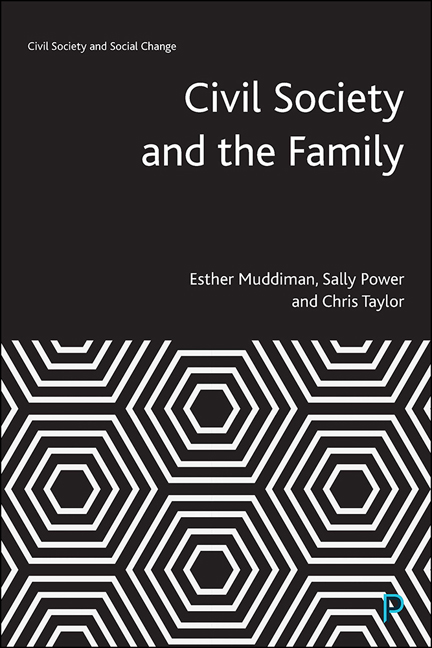Book contents
- Frontmatter
- Contents
- Tables
- Figures
- Notes on the Authors
- Acknowledgements
- 1 Starting Points
- 2 The Paradoxical Positioning of the Family and Civil Society
- 3 The Challenges of Researching the ‘Private Sphere’ of the Family
- 4 The Uncertain Business of Raising Citizens
- 5 Keeping the Faith? Secularisation, the Family and Civic Engagement
- 6 Mothers, Grandmothers and Civic Engagement
- 7 Family Arguments: Finding one’s Voice
- 8 Politicising Family Food Practices
- 9 The Upward Transmission of Civic ‘Virtues’
- 10 Reframing Civil Society and the Family
- References
- Index
8 - Politicising Family Food Practices
Published online by Cambridge University Press: 18 March 2021
- Frontmatter
- Contents
- Tables
- Figures
- Notes on the Authors
- Acknowledgements
- 1 Starting Points
- 2 The Paradoxical Positioning of the Family and Civil Society
- 3 The Challenges of Researching the ‘Private Sphere’ of the Family
- 4 The Uncertain Business of Raising Citizens
- 5 Keeping the Faith? Secularisation, the Family and Civic Engagement
- 6 Mothers, Grandmothers and Civic Engagement
- 7 Family Arguments: Finding one’s Voice
- 8 Politicising Family Food Practices
- 9 The Upward Transmission of Civic ‘Virtues’
- 10 Reframing Civil Society and the Family
- References
- Index
Summary
Introduction
This chapter explores the role of family mealtimes and shared food practices in fostering skills and values that may be of benefit to civil society. A number of scholars have emphasised the importance of food and mealtimes for family life, and we extend this argument by outlining the ways in which skills and values developed in family food spaces can shape and inform political and civic activities. We begin by considering how food is incorporated into family routines and the extent to which mealtimes are considered an important family activity. We did not design the research project with food and family mealtimes in mind; however, during our interviews with parents and grandparents, these aspects of family life soon emerged as significant. Our discussions with participants indicate that shared family meals provide valuable spaces for family members to come together and learn from one another. We argue that family dinners also have significance beyond the family as an important vehicle for civic and political socialisation, providing an interesting site for the development of certain skills, values and knowledges that can help to equip family members to participate in wider civil society.
We then think about the provision of food as symbolic of care for other family members, and demonstrate how the symbolism of food as care can, in some cases, extend beyond the home to connect and communicate a sense of care and responsibility beyond the family unit. In the final section of the chapter, we turn to the moral and ethical values attributed to certain foods in order to explore how family food choices can act as mobilisations of ethical, political and environmental issues.
Food and family routines
A number of scholars have underlined the importance of food for the construction and maintenance of family bonds. In her classic text Feeding the Family, Marjorie DeVault (1991: 39) emphasises the practical work involved in ‘doing family’, explaining that a family is not a ‘naturally occurring collection of individuals’, but instead ‘constructed from day to day, through activities like eating together’. Similarly, Jackson (2009: 5) focus on ‘the practice of everyday life’ in which ‘the family’, as a social structure, is reproduced through routine activities like cleaning, cooking and caring for children.
- Type
- Chapter
- Information
- Civil Society and the Family , pp. 141 - 158Publisher: Bristol University PressPrint publication year: 2020



